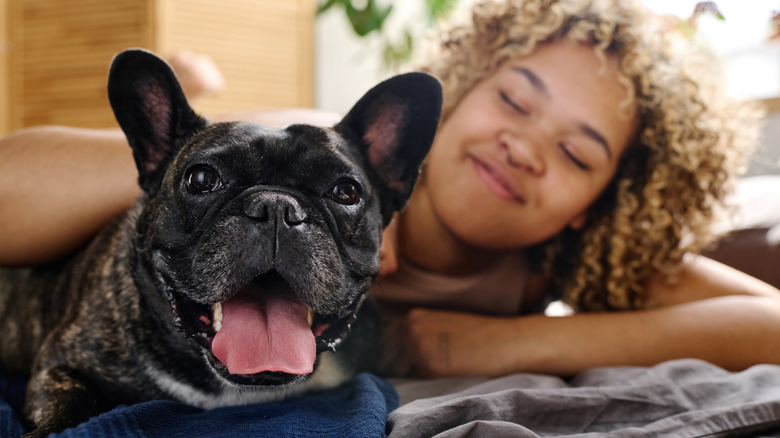Scientists Uncovered The Core Dog Owner Types And They're Too Accurate
Ever since the first wolves became domesticated thousands of years ago, humans have kept pet dogs. Just a few of the reasons include companionship, protection, herding livestock, tracking criminals, detecting explosives, and helping people with conditions such as blindness and diabetes. In recent decades, dogs have become part of the family like never before, more likely to be found snoozing on the couch than herding sheep or chasing thieves.
A 2024 study published in Scientific Reports examined how the beliefs and behaviors of dog owners affected the behavior of their pets. In particular, the study probed to see whether the welfare of canine companions was affected by the humans' management practices, such as disciplinary measures, training tools, housing conditions, and the amount of time spent with the dog each day. The study's results showed no causal link between dog welfare and owners' beliefs regarding the nature of the canine-human relationship but, interestingly, did nail down three clear types of dog owners.
The 3 types of dog owners, explained
Of the 790 dog owners in Hungary who responded to the survey, almost half (49.5%) were classified by researchers as "dog parents." They're the owners most likely to treat their dogs as family members, training the dog to sleep in the bed with them, dressing the dog in a costume on Halloween, or incorporating the dog into a daily workout routine. "Dog parents" form an intimate bond with their pet — similar to the human parent-child relationship — and are likely to house their dog indoors, feel uneasy whenever the animal goes off-leash, and spend much time with their fur baby. Think Bruiser from "Legally Blonde."
Approximately one-fifth (19.4%) of the survey respondents were named "companion dog owners." What does this mean? According to the study, "emotional distance" is the trademark of this group. Dogs are still members of the families for these folks, but they aren't babied in the same way that the previous group is likely to act. Overall, these owners usually train their dogs well but spend the least amount of time with their pets every day. Here, Comet from "Full House" is a shining example. The family adores him, but he's not always engulfed in attention.
Finally, almost a third (31.1%) of the respondents were identified as "dual status owners." These owners see their dogs as companions who also serve a utilitarian purpose, fulfilling the social role of colleague, family member, friend, or child while also acting in the non-social role of domesticated animal or "assistance/guard dog." For this type of owner, their dog is likely viewed as a family member who also is obedient and provides protection. Krypto from "Superman" is a good example here; Clark Kent loves him, but he's also his owner's sidekick in a way.

